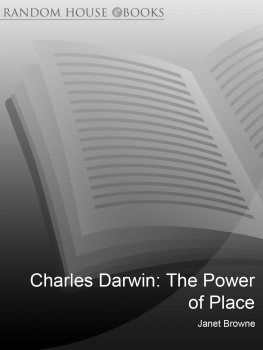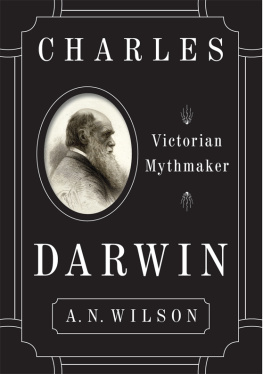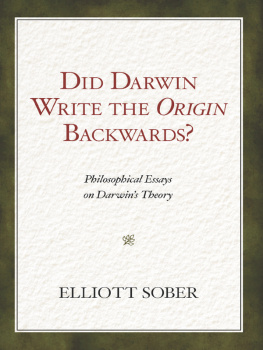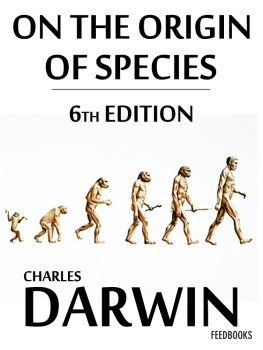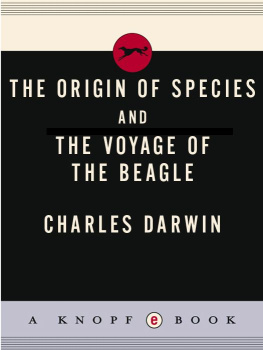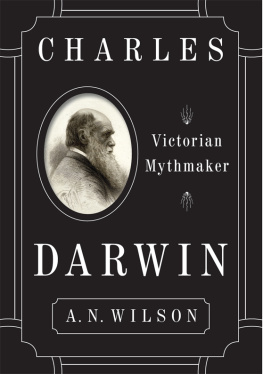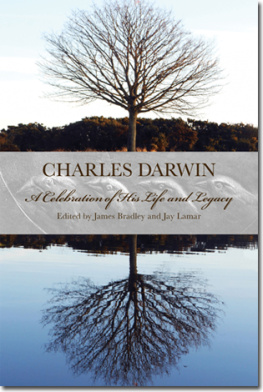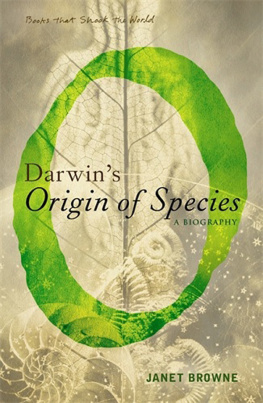Contents
About the Book
Winner of the 2003 National Book Critics Circle Award for Biography and the Royal Society of Literatures W. M. Heinemann Prize 2003.
This concluding volume of Janet Brownes magisterial biography covers the transformation in Darwins life after the first unexpected announcement of the theory of evolution by natural selection and the publication of On the Origin of Species in 1859. Always a private man, Darwin found himself a controversial figure, reviewed and discussed in circles that stretched far beyond the boundaries of Victorian science.
Janet Browne here examines the wider publishing world of Victorian England and the different audiences that responded to the ideas of one of the leading thinkers of the nineteenth century and considers the Darwinian revolution from Darwins point of view.
About the Author
Janet Browne is a zoologist and historian of science. She is at present Professor in the History of Biology at the Wellcome Trust Centre for the History of Medicine at University College, London. The first volume of her biography Charles Darwin: Voyaging is also published in Pimlico.
Also by Janet Browne:
Charles Darwin, Volume 1: Voyaging
Praise for Charles Darwin: The Power of Place
The second, final volume of her magnificent life of [Darwin]. Much the best biography of Darwin to date, it makes irresistible reading. Miranda Seymour, Top Five Books of the Year, Sunday Times
Biographies of Charles Darwin are scarcely an endangered species... a few are moderately interesting and fulfilling, but none has offered the promise of this, the second volume of Janet Brownes study of the worlds greatest biologist. Robin McKie, Observer
Magisterial, beautifully written and paced, wise, scholarly and a rivetting read. Jackie Wullschlager, Financial Times
A marvellous book... This second part of the life stands on its own. Soothing, unhurried and absorbing Jane Ridley, Spectator
From beginning to end, the book is richly informative and a delight to read. Michael T. Ghiselin, Times Literary Supplement
Brownes first volume was warmly received when it appeared seven years ago, and the second triumphantly fulfils its promise... [a] remarkable book. James Secord, Daily Telegraph
One of the most distinguished of all modern biographies. Guardian
A richly detailed, vivid and definitive portrait with not a word wasted: the best life of Charles Darwin. Kirkus Review
Brownes subject is monumental, but her writing style is never overburdened by the weight. Rather, her prose is elegant in its clarity of thought, her craftsmanship impeccable in the way it weaves a coherent whole from the innumerable threads of thought, experience and persona that comprised this colossal life. Publishers Weekly
Monumental and absorbing J. B. Pick, Scotsman
If you want to take the measure of his greatness, this is the book you should read. Anthony Daniels, Sunday Telegraph
Brownes triumph in this second of her two volumes is that, while analysing a great scientist, she continues to evoke a flesh-and-blood mortal. G. S. Rousseau, Literary Review
Out of all the virtues of Janet Brownes outstanding biography, the clinching one is the unassuming manner that respects and conveys the spirit of its subject so well. Marek Kohn, Independent
A magnificent achievement. Browne combines a clear and sympathetic account of Darwins later years with a brilliant analysis of the phenomenon that became known as Darwinism. John Gardiner, BBC History
Janet Brownes meticulously organised and beautifully written two-volume biography... is as racy and exciting as any Victorian novel, and a fitting tribute to a truly great man. John Banville, Irish Times
Sharing her subjects passion for detail, but presenting her mountain of facts in a buoyant narrative, Browne maps the intricate ecosystem Darwin inhabited. Jane Gregory, New Scientist
For Kit and Evie (again)
Charles Darwin: The Power of Place
Volume II of a Biography
Janet Browne

part one
AUTHOR
chapter 1
STORMY WATERS
IF CHARLES DARWIN had spent the first half of his life in the world of Jane Austen, he now stepped forward into the pages of Anthony Trollope.
Victorian Britain seemed to be at peace with itself as political agitation at home and memories of the Crimean War and Indian uprising gave way to relative stability in the late 1850s and early 1860s. Free trade and carboniferous capitalism pushed ahead as the great manufacturing industries of the nation boomed. In the grand houses of London, Viscount Palmerston picked up his silk hat to become prime minister in 1857, followed in short order by Lord Derby in 1858, and then Palmerston again in 1859, while Benjamin Disraeli, William Gladstone, and Richard Bright stalked the wings impatient to transform the face of party politics. Cathedral cities hummed with religious controversy; books and magazines poured from the presses; the newly affluent took tours and holidays; and a whole army of clerks, civil servants, bureaucrats, bankers, and accountants was called into being to administer the fresh commercial horizons that accompanied the emerging empire, as India, China, Canada, South America, and the Antipodes increasingly fell under British economic domination. Steam technology was the hero of society. At that time Britain possessed two-thirds of the worlds capacity for cotton factory production and accounted for half the worlds output of coal and iron, an unmatched degree of industrial preeminence. The length of railway track snaking across the countryside doubled from 1850 to 1868. Lawnmowers, water-closets, gas lights, iron girders, encaustic tiles, and much, much more were available to those who could afford them. Although Queen Victoria and her ministers were soon to encounter complex foreign Confidence soared. Social boundaries shifted.
Even so, the contradictions at the heart of Victorian life were more obvious than ever. Fraud, filth, overcrowding, poverty, death, and violence were a fact of life in the urban slums. Rural communities had lost in a decade more than 40 percent of the male workforce to industrial, colonial, and military demands and bleakly faced another round of agricultural depression and distress. The nations religious faith, although never coherent, was fracturing into fervour or dissent. While many from the ruling ranks of society turned a blind eye to these issues, a remarkable array of novelists, statisticians, medical men, radical divines, and social activists were starting to reveal the squalor alongside prosperity and discovering the interesting in the ordinary. In time, parliamentary leaders would open their minds to a second round of political reform in the nineteenth century, egged on by the high sense of purpose, moral earnestness, doctrines of self-help, and appreciation of decorum that characterised the emerging middle classes. From real-life Westminster to imaginary Barchester and back again, Trollope easily captured in his novels this sense of the personal and parochial. But life was not simple even for those whom Lord Salisbury called persons of substance. These mid-century years were not so much an age of equipoise as framed by social and political contrasts. It was an age of capital, labour, complacency, and faith; at the same time, an age of cities, misery, change, commerce, deference, and doubt.
Next page
